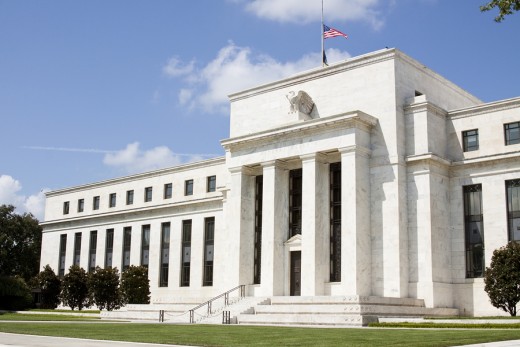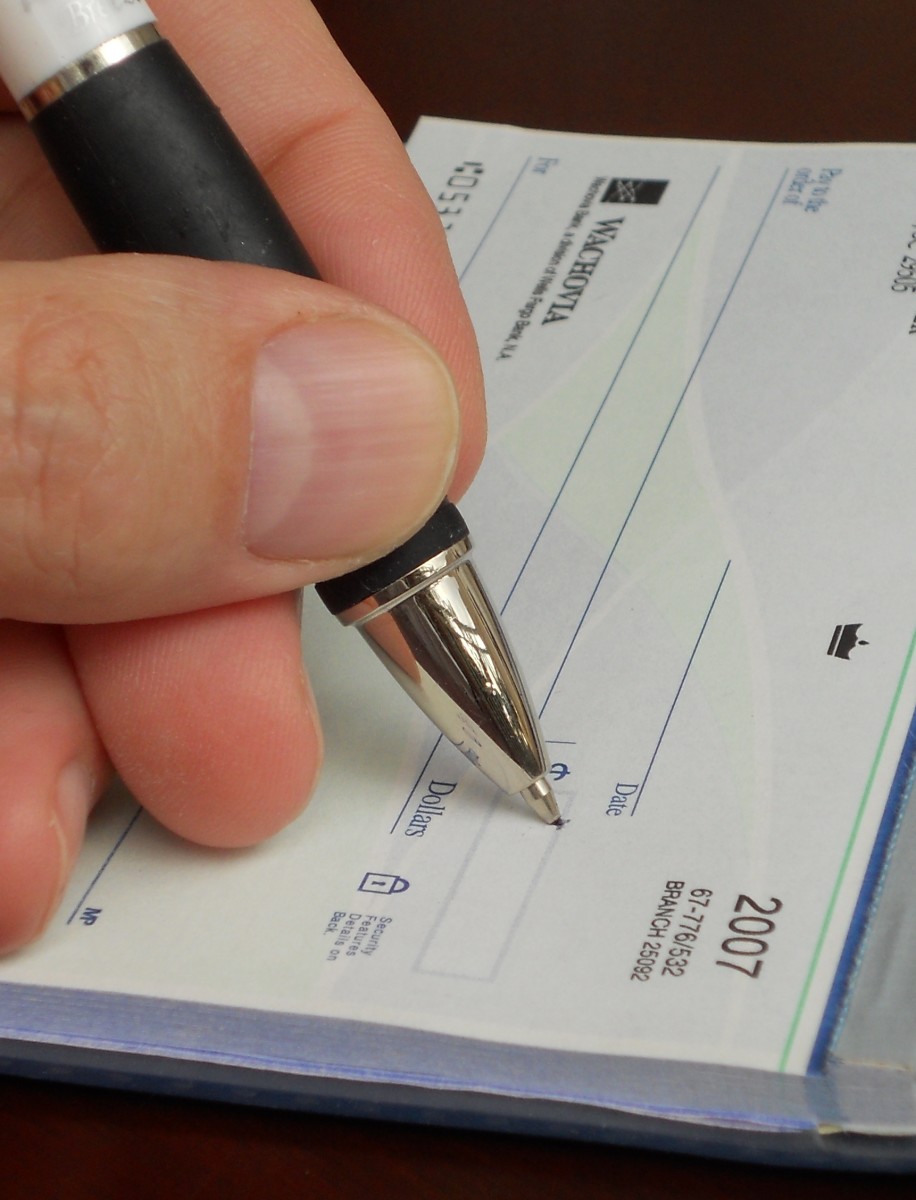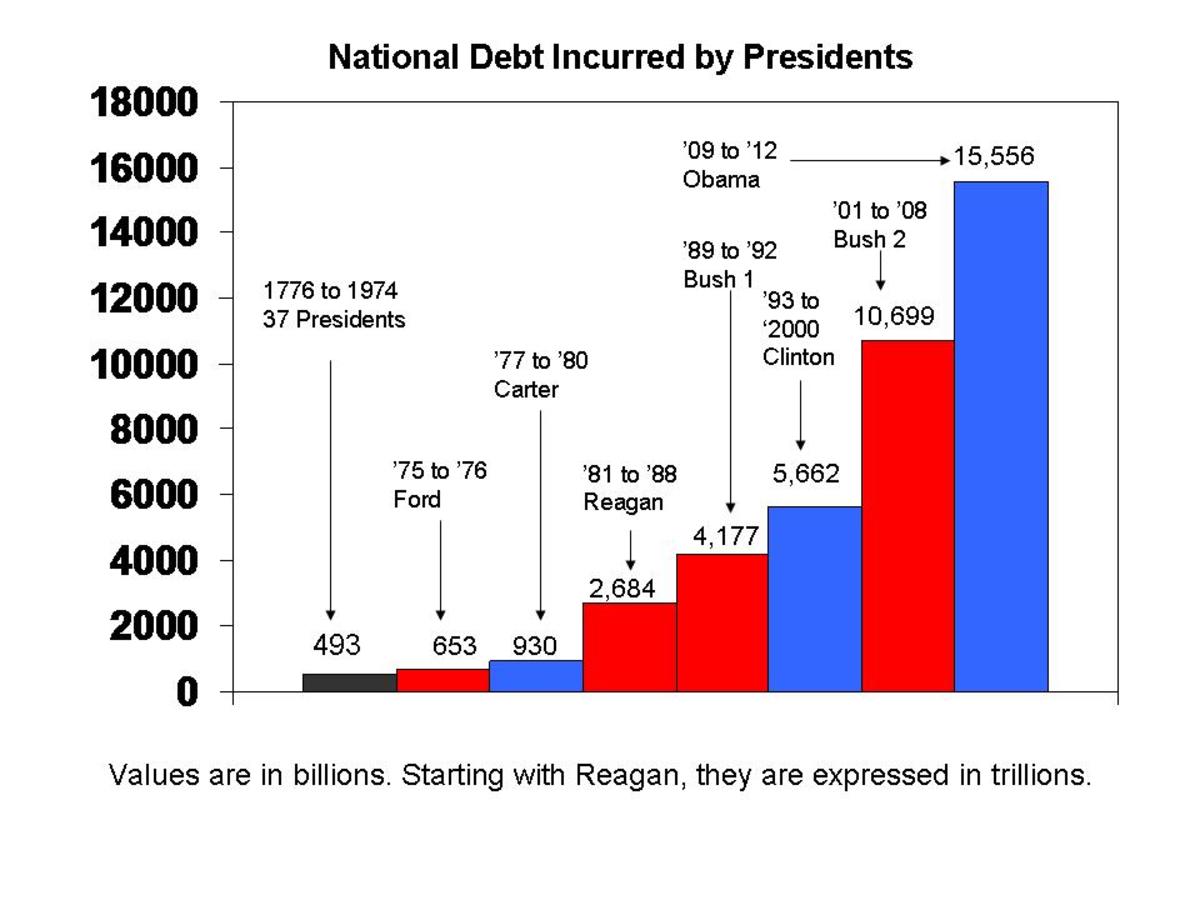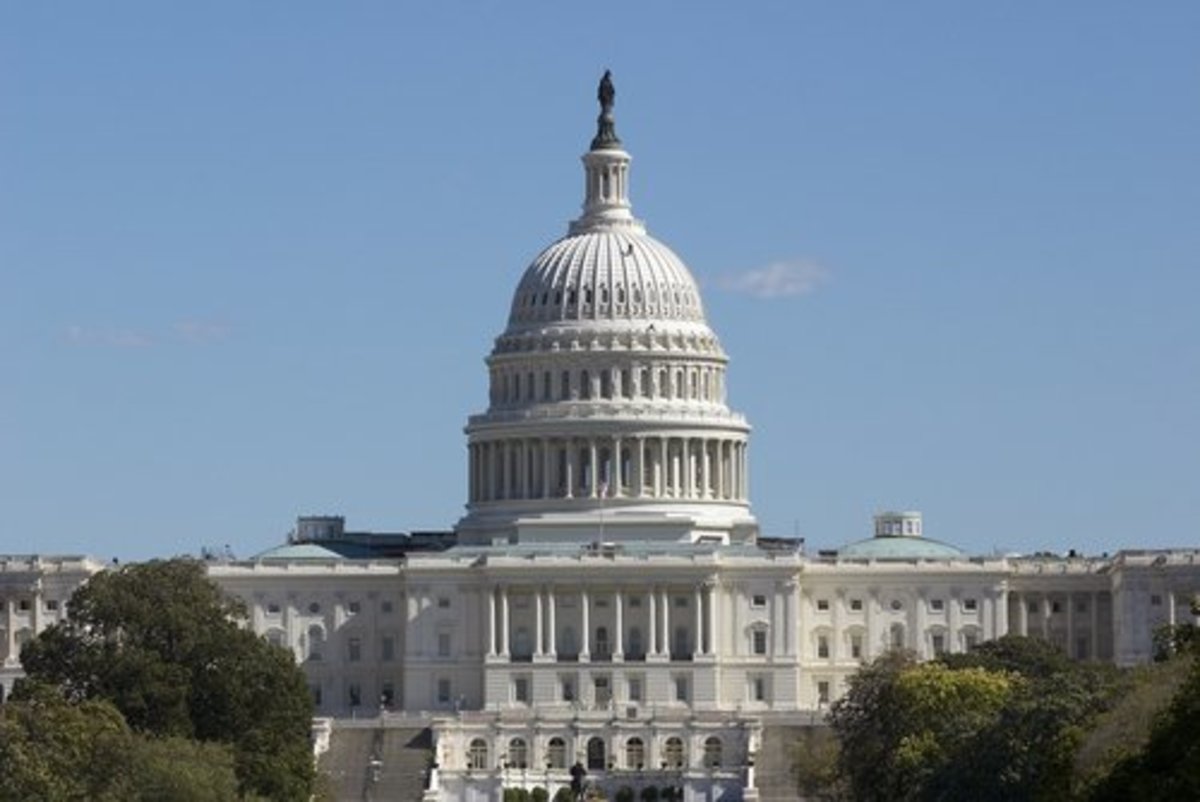Who are America's Creditors? or, Debt Economics for Beginners

Introduction to the world of your country's debt
Thanks to all of you who read and enjoyed The U.S. National Debt – 233 years in the making. Here, at last is the third article in this series on World Debt – Who are America’s Creditors? Or, debt economics for beginners.
Let us fittingly start this article with wise words from one of the founding fathers:
"There is in the nature of government an impatience of control that disposes those invested with power to look with an evil eye upon all external attempts to restrain or direct its operations. This has its origin in the love of power. Representatives of the people are not superior to the people themselves." Alexander Hamilton - Federalist Papers, 1787.
U.S. Treasury Department will tell us the current National Debt to the penny
As of today’s date (January 27, 2010), the U.S. national debt sits at $12,301,772,321,038.04 according to the U.S. Treasure department website. http://www.treasurydirect.gov/NP/BPDLogin?application=np
This is broken down into two main categories:
Debt Held by the Public $7,784,152,852,860.25
Intragovernmental Holdings $4,517,619,468,177.79
Which tells us very little
The treasury department will gladly tell you the detailed make-up of these amounts, along with impressive pie charts, bar graphs and officious tables, along with signed opinions from their auditors certifying the report as being fair, audited and truthful (in accordance with the legal guidelines as set forth in the U.S. generally accepted accounting principles and under 31 U.S.C. 3512 (c) and (d) – a piece of legislation commonly known as Federal Managers Financial Integrity Act. Here is a link to a PDF copy of their report on the audited financial statements of the United States Treasury. http://www.treasurydirect.gov/govt/reports/pd/feddebt/feddebt_ann2009.pdf Go there and read the document for yourself, but you know what?
It won’t tell you who America’s creditors are
Back to searching we go.
Be sure not to get lost in some of the more strident sites, or lose your perspective in the tons and tons of misinformation out there. Don’t be sidetracked by headlines such as “We Owe Our Nations Future to the Chinese -- $12 trillion” attached to sites with names like “America – Let’s Take Her Back.” Nope. And ignore those who call for “stiffing the bastards trying to steal our country,” those foreign S.O.B.’s taking advantage of U.S. spending and need, buying up our treasury bills in a bid to take over.
Keep your head. America’s biggest creditors are not foreign governments
Here is a link to a report listing the major foreign holders of treasury securities. http://www.ustreas.gov/tic/mfh.txt It’s dry, boring reading, so I’ve pulled out the highlights. And I’ve taken the liberty of breaking down the domestic portion, so now I can give you a countdown of those people holding the American pie.
America’s Major Creditors
Figures given are as of September 2009. (Latest available. Apparently, the Treasury Department can issue audited financial statements for fiscal 2009, but cannot account for foreign investment for the entire year. Who can figure?)
- 15: Luxembourg – $104.2 Billion
- 14: Depository Institutions – $107.3 Billion (commercial banks, savings banks, credit unions)
- 13: Russia – $119.9 Billion
- 12: Insurance Companies – 126.4 Billion
- 11: Brazil – 139.8 Billion
- 10: Caribbean Banking Centers – 189.7 Billion
- 9: Oil Exporters – $191 Billion
- 8: United Kingdom – $277 Billion
- 7: Pension Funds – $465.4 Billion
- 6: State and local governments – $522.7 Billion
- 5: Other Investors – $629.7 Billion (“other” refers to individuals, government sponsored enterprises, brokers and dealers, bank personal trusts, estates, corporate and non-corporate businesses)
- 4: Japan – $757.8 Billion
- 3: China – $789.4 Billion
- 2: Mutual Funds – $769.1 Billion
- 1: Federal Reserve and Intergovernmental Holdings – 4.785 Trillion
Did you notice number 1 – the Federal Reserve and Intergovernmental Holdings? What does that mean?
You know who the Federal Reserve is: those folks who buy up Treasury Bills by running the printing presses overtime. They are trying to “plug the gap” caused by a slowdown of private credit/debt creation. You see, non-American demand for the good old greenback must remain high, or the dollar will fall in value (causing inflation) but demand for U.S. assets is negative these days, so the Federal Reserve monetizes Government debt by enabling foreign banks to swap their debt for Treasury debt, BUT the fact remains, however cleverly obscured, the money is being created out of thin air, and used to buy U.S. government debt.
This is a dangerous game – one that would make a flim-flam man on the street blush
Let’s think of it this way:
Check kiting – the flim-flam man has empty checking accounts at The Bank of High Hope and The Bank of Big Dreams. He writes a check for $25,000 to High Hope from his account at Big Dreams, and because he’s cleverly built up a reputation for credit at the former, they allow him to withdraw funds, before the check clears on the latter.
The same game is played on an international level. Central Bank of Noplace prints up a bunch of money and buys the debt of the Republic of Wherever. Then the Central bank of Wherever prints up a bigger bunch of money and buys the debt in the form of treasury bonds issued by the government of Noplace. This way it’s not so damn obvious they’re buying up their own printed paper.
Check kiting – individuals go to jail for it; countries run their economies on it.
Trading on U.S. paper assets now negative
Lately, according to reviewers of Treasury International Capital flows (TIC), they have noted a drastic decline in foreign demand for U.S. paper assets. In fact, those holding same have started selling them off (and who wouldn’t, considering their worth is baseless and dropping daily.)
Over the past year, a disturbing change has taken place. Prior to the Bush administration and the resultant spending spree, foreigners bought U.S. assets, and did this by bringing foreign earned money into the U.S. and leaving it here. Now, the process has reversed and become negative.
In the meantime, China is sitting on a huge reserve of U.S. paper, and so is Japan. This certainly puts them in a position to do harm to the U.S. dollar (and they are, by necessity.) But take heart, right behind the pension funds, sits Britain, a long time ally, and one who’s industrial recovery perplexes many who ponder America’s inability to turn things around.
What does this mean? Nothing good. Start up the presses and kite more checks.
And what about the other half of this $4.8 trillion – Intergovernmental holdings?
Did you notice, these two debt holders are lumped together? I wonder why. And what are they?
This represents the portion of the national debt on the books of federal government accounts, primarily Social Security, and Medicare, Medicaid – those plans paid in advance by American citizens, from which the government has spent every available dollar and replaced it with one of the Federal Reserve’s IOU’s.
That’s right. By far the biggest holder of the U.S. National Debt is the American citizen,
by way of what is facetiously called, the nation’s Trust Funds. Not only are Americans on the hook for this tremendous $12 trillion debt, they are owed money by the same body that collects their taxes each year. See this article on the pillage of the nation’s trust funds. http://mwhodges.home.att.net/cur-year-deficit-trusts.htm *1 see quoted text from this article below.
That’s right; you paid in to Social Security; you pay interest on the same money because the government spent what it actually owes you, and furthermore - - you now have to pay it back – again.
For more information on the history of Social Security and what has happened to the $2.6 trillion dollar surplus that is supposed to be there to pay the baby-boomers benefits (seeing as they were prepaid) go to "What we all need to understand about Social Security."
You are your nation’s creditor, cosigner, and collateral all rolled into one.
Don’t blame the Chinese; they’re only looking after China. (As they should do.)
A moment of silent contemplation here.
No! Can’t be so.
“Not to worry”, say the financial pundits. “The United States is the biggest economy in the world, and if you look at U.S. GDP (Gross Domestic Product see http://en.wikibooks.org/wiki/Principles_of_Economics/GDP) you’ll note that our debt in relation to our GDP has lowered from certain points in history. “
This is a true statement according to the charts –
which would only be explicable if the economy was in growth. Is it? Do you really need me to go dig up any facts on this question?
What is in the GDP?
It’s supposed to be the value of goods produced by a nation within any fiscal period. I believe the critical word in this phrase is goods. There’s far more than goods in today’s reported GDP, and this bears examination.
Debt to GDP ratio may be a reliable indicator of the current economic state of affairs if we can trust these numbers, though I have trouble believing anyone (individual, institution or nation) can be considered fiscally healthy when debts are equal to or more than the entire productive output from everyone for a year. ($14 trillion a year in production according to the financial reporters, and this leaves no room for service of privately held debt.)
But can we trust these numbers held out to us as indicators of our economic health?
That is the subject of the next article in this series on world debt. In the meantime, if anyone wants to jump ahead, here’s a link to an excellent article on the art of chicanery in financial reporting by the government. In particular, visit the section on statistical wizardry -- well worth reading. (http://mwhodges.home.att.net/product.htm)
Quotes relating to this article:
*1 “ …. the first real step in looting the Social Security Trust Fund was in 1985, when President Reagan was in a battle with Congress over raising the National Debt limit. The increase was badly needed to avoid going into default on Treasury Securities interest payments. So Treasury Secretary announced that he would sell Treasury Securities in the Social Security trust Fund to raise the cash until Congress raised the debt limit.
Congress called a Hearing on the subject. on 30 Sept 1985, "Hearing on Disinvestment of the Social Security Trust Fund to Finance the Public Debt." OK, so that meant (at that time) there were actual saleable securities being held in the trust fund or he could not have sold them. You can't sell an unmarketable IOU (which is all the trusts now hold). Congress was upset at the idea of selling securities which belonged to a trust fund. That would be illegal. So they held the meeting (declared a temporary emergency, and away they went). I got a copy by going to the archives at a local University Library. The 49 pages were in very fine print, and were on microfiche. The minutes show how shocked Congressmen were at the thought of doing something like this. Treas. Sec Baker's representative said that he was just using good management judgment and protecting the honor of the United States in paying the current debts of the country. This was the most expedient way to do it (unless they raised the debt limit for more outside borrowing, which politically they were afraid to do with Reagan as President). After hours of pros and cons, they all finally agreed that this was a temporary measure in an unusual case, and that when the emergency was over, the Treasury Securities would be replaced by buying them back. So they approved what Baker wanted to do.
I guess they saw a good thing, the emergency was never declared over, even when the debt level was raised, so they looted all of the trust funds, all 150 of them. And that is the way it has been ever since.
In some prior years, they had borrowed a little here and a little there. Changed laws to cover the allotment of FICA funds between SS /Medicare/ and Disability Ins. But that was generally all done in a legal manner. This activity since 1985 is a FRAUD pure and simple. “ – Tom Smith webmaster of National Debt. com
The Trust Fund is just an EMPTY IOU - just a piece of paper
(March 21, 2005, President George Bush - in Denver, Colorado) “Now, you probably think -- some of you may think there's what they call a Social Security trust: the government collects the money for you, we hold it for you, and when you retire, we pay it to you. But that's not how it works. You pay your payroll tax; we pay for the people who have retired, and if there's any money left over, we spend it on government. That's how it works. And what's left is an empty IOU, a piece of paper. Because it's a pay-as-you-go system, when more retirees start retiring, who are living longer, getting paid more, more money starts going out than coming in.”
"Treasury Secretary: Social Security Has 'no Assets' By Jeannine Aversa Associated Press Writer Published: Jul 10, 2001, WASHINGTON (AP) - Treasury Secretary Paul O'Neill, responding to Democratic critics in Congress, said anew Tuesday the Social Security retirement program has no real assets and must be strengthened. However, "because the Social Security trust fund does not consist of real economic assets, we are left to rely on the federal government's future decisions to either raise taxes, reduce spending or increase borrowing from the public to finance fully Social Security's promised benefits," O'Neill said.
Quotes from two economists commenting on the article “The Shell Game.”
“I predict, given that nothing will be done until the Treasury is within days of bankruptcy, that an emergency session of Congress will then slash social security and Medicare benefits to anyone with a resemblance of membership in the middle class or above. I.e. the first major default will be on promises the federal government made to its citizens.”
“I might take that bet, xxxxxx; what's the over-under on the household income cap for getting screwed?”
Need a smile after all this?
(smile courtesy of Michael Hodges author of Grandfather National Debt Report -- a site well worth visiting.)
Why did the chicken cross the road?
ANSWERS:
Bill Gates: I have just released the new Chicken XP, which will both cross roads AND balance your checkbook, though when it divides 3 by 2 it gets 1.4999999999.
The Bible: And God came down from the heavens, and He said unto the chicken, "Thou shalt cross the road." And the Chicken crossed the road, and there was much rejoicing.
Freud: The fact that you thought that the chicken crossed the road reveals your underlying sexual insecurity.
L.A. Police Department: Give me ten minutes with the chicken and I'll find out.
Richard M. Nixon: The chicken did not cross the road. I repeat, the chicken did not cross the road.
Saddam Hussein: This was an unprovoked act of rebellion and we were quite justified in dropping 50 tons of nerve gas on it.
Saddam Hussein #2: It is the Mother of all Chickens.
Saddam Hussein #3: I will not allow anyone to inspect my chickens.
CIA Director: No weapons of mass destruction here. They must be on the other side - - I hope.
Dr. Seuss: Did the chicken cross the road? Did he cross it with a toad? Yes! The chicken crossed the road, but why it crossed it, I've not been told!
Ernest Hemingway: To die. In the rain.
Buddha: If you ask this question, you deny your own chicken nature.
Martin Luther King, Jr.: I envision a world where all chickens will be free to cross roads without having their motives called into question.
The Pope: That is only for God to know.
Grandpa: In my day, we didn't ask why the chicken crossed the road. Someone told us that the chicken had crossed the road, and that was good enough for us.
Colonel Sanders: I missed one?
Government staff before congressional committee: I don't recall why chickens come home to roost on my side of the road - - but if you push I'll take the 5th or leave the coop.
Politician: A chicken in every pot will 'save the children' and protect my own perch.
Influence investor: I heard wealthy chickens receive free lodging while being plucked at a special house across Pennsylvania Avenue.
Affirmative action advocate: Chickens have been discriminated against. They should be granted special class privileges. Retribution payments might be realized across the road.
Retired Chicken: On this side they said they 'saved social security' for chickens by building a trust fund surplus, but actually they spent every penny of the surplus on non-pension stuff as fast as the money arrived, leaving non-marketable IOUs instead of real money. I hope the other side of the road has its trust fund 'surplus' saved for future chickens in hard cash or in fully marketable securities, since chickens can't buy corn during retirement with non-marketable IOUs.
Working Chicken: On this side they say my FICA taxes will produce a negative return toward my retirement. On the other side they believe in UFOs.
Attorney: Chickens are invited to cross the road to join a class action lawsuit against all non-chickens.
Parent: Teachers have credentials, but my chicks can't read. The President said he's looking for volunteers on the other side to teach chicks to read.
Environmentalist: The chicken crossed the road to escape blame for earth warming.
Voter: Maybe if I cross the road and believe the other party's slogan, "vote for us and you will not be plucked."
Voter #2: I will no longer vote, because they plucked me on the other side, too.
Economic student: Government said they had another surplus. How can that they say that when each year they increased total debt to another record? I hope they count chickens differently on the other side.
Bill Clinton: I did not cross the road with THAT chicken. What do you mean by chicken? Could you define 'chicken,' please?
8th Grade chicken: On my side two-thirds of graduates need remedial work in college to make up what they didn't learn in high school. On the other side you can skip high school and go direct to college.
12th Grade chicken: On this side we take 'math & science,' yet come in last measured against students from other nations. Maybe the other side lets us attend foreign schools..
Teenager: To prove that he wasn't a chicken.
Chicken lawyer: After the 2000 election all the nation's lawyers stopped chasing ambulances for awhile, and crossed over to Florida - - to count votes for Bush & Gore, 'til they dropped.
Accountant-auditor chicken with a Big 5 firm: Because it's more profitable to audit and OK 'cooked' books on the other side.
Enron chicken: on the other side you can run up debt and hide the fact, just like politicians do with the social security trust fund.
Truck driver: To prove to the armadillo that it could be done.
Federal Reserve Chairman: On this side of the road we can get away with reducing interest rates that wipes out 70% of income to senior citizen who saved for their retirement, so we can subsidize more debtors and our beloved banks. Horror of horrors if they move to the other side where Federal Reserve Banks are not allowed, and up-to-the-eyeball debtors are non-existent, and then those savors get to retain and improve their living standards.
Banker #1: on the other side of the road you can hide off-balance sheet debt from the markets, regulators, shareholders and auditors.
Banker #2: moving assets worth very little to the other side where we can mark them to whatever price we like to pump up assets and then sell them to the greater fools out there.
Banker #3: even a better idea on the other side is that there the Federal Reserve will bail you out and subsidize your bad assets.
Mortgage broker: get the nice couple to sign up for a toxic house mortgage, collect fees on this side and tell them not to worry as they can surely trust you, and then move your office to the other side where they can't find you.
Mortgage broker #2: make sure they borrow and spend all their home equity on this side and pay tons of fees and interest, because if they escape to the other side they might not borrow to consume their home equity and horror of horrors might never borrow again, instead becoming free and clear for their future.
CEO: if your company is going down the tubes, don't tell anybody but quickly grab your golden parachute and zip to the other side of the road to the cool life you earned.
Al Gore: I invented the chicken! So I, not the chickens, get to decide which side all chickens get to live.
Albert Einstein: Did the chicken really cross the road, or did the road move beneath the chicken?
Pat Buchanan: To steal the job of a decent, hardworking American.
Colin Powell: Now to the left of the screen, you can clearly see the satellite image of the chicken crossing the road ...
George W. Bush: We don't really care why the chicken crossed the road. We just want to know if the chicken is on our side of the road, or not. The chicken is either against us, or for us. There is no middle ground here.
Barack Obama: The chicken crossed the road because it was time for a CHANGE! The chicken wanted CHANGE!
That's right -- smile. A true hero smiles in the face of adversity.
Hope this article has been of some help -- Lynda M. Martin








